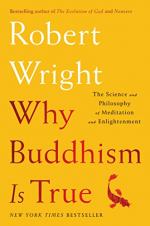
|
1. What effect is the author's choice of the word "delusions" intended to have on the reader?
Wright repeatedly uses the word delusion to characterize the evolutionary tool of natural selection as negative, perhaps even malicious. This personification of a biological phenomenon makes it seem as if it were deliberately attempting to thwart an organism in the present. Though this is clearly false, as natural selection is not conscious and cannot make deliberate decisions, the author uses the word delude to show how the evolutionary results on a present-day organism can be detrimental. Later, he does admit that his use of the word delusion is not “in the more dramatic sense of that word” (5).
2. How does the author use the example of bodily fluids in order to demonstrate the differences between Western Buddhism and Traditional Buddhism?
Wright uses a few vividly descriptive quotes to illustrate his point about how Western Buddhism distorts Asian Buddhism. Specifically, he argues that Western Buddhism selects more readily receivable aspects of Asian Buddhism to present to Western audiences while ignoring others. He quotes a foundational text in Buddhism, The Four Foundations of Mindfulness, by listing a number of bodily fluids— “feces, bile, phlegm, pus, blood, sweat, fat, tears, skin-oil, saliva, mucus, fluid in the joints, urine” (12). This is a list of things that the Buddhist text asks readers to meditate on. Additionally, one is to imagine one’s own corpse, “bloated, livid, and festering” (12). He points out the apparent lack of both of these concepts in popular Western Buddhism, presumably because these meditations would not be appealing. By writing in this extreme and memorable language, Wright is sure to make clear the differences between these two related schools of thought.
(read all 60 Short Essay Questions and Answers)
|
This section contains 6,865 words (approx. 23 pages at 300 words per page) |

|




